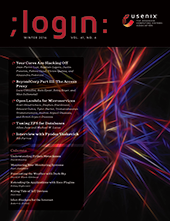
Your Cores Are Slacking Off—Or Why OS Scheduling Is a Hard Problem
;login: Enters a New Phase of Its Evolution
For over 20 years, ;login: has been a print magazine with a digital version; in the two decades previous, it was USENIX’s newsletter, UNIX News. Since its inception 45 years ago, it has served as a medium through which the USENIX community learns about useful tools, research, and events from one another. Beginning in 2021, ;login: will no longer be the formally published print magazine as we’ve known it most recently, but rather reimagined as a digital publication with increased opportunities for interactivity among authors and readers.
Since USENIX became an open access publisher of papers in 2008, ;login: has remained our only content behind a membership paywall. In keeping with our commitment to open access, all ;login: content will be open to everyone when we make this change. However, only USENIX members at the sustainer level or higher, as well as student members, will have exclusive access to the interactivity options. Rik Farrow, the current editor of the magazine, will continue to provide leadership for the overall content offered in ;login:, which will be released via our website on a regular basis throughout the year.
As we plan to launch this new format, we are forming an editorial committee of volunteers from throughout the USENIX community to curate content, meaning that this will be a formally peer-reviewed publication. This new model will increase opportunities for the community to contribute to ;login: and engage with its content. In addition to written articles, we are open to other ideas of what you might want to experience.

As a central component of resource management, the OS thread scheduler must make sure that ready threads are scheduled on available cores. As surprising as it may seem, we found that this simple rule is often broken in Linux. Cores may stay idle for seconds while ready threads are waiting in run queues, delaying applications and wasting energy. This phenomenon is not due to an intentional design but to performance bugs. These bugs can slow down scientific applications many-fold and degrade performance of workloads like kernel compilation and OLAP on a widely used commercial database by tens of percent, particularly on machines with a large number of cores. The root cause of the bugs is the increasing scheduler complexity, linked to rapid evolution in modern hardware. In this article, we describe the bugs and their effects and reflect on ways to combat them.
